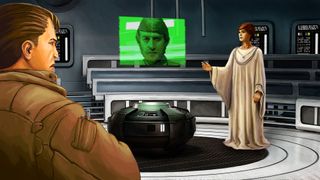Preserving old games was seen as a non-commercial 'art project' until recently, says Nightdive director: 'They were great then and they're great now, and companies have begun to realize that'
Nightdive's Stephen Kick and Larry Kuperman shared their thoughts on the importance of videogame history in an interview with PC Gamer at GDC.

The Nightdive Studios website makes its mission clear: "Bringing lost and forgotten gaming treasures back from the depths." And so it has, through outstanding updates of games including Quake and Quake 2, System Shock, Turok 3, and Dark Forces. But it's not just the games that Nightdive aims to bring back from the past: Maintaining the totality of their history is a major part of what the studio aims to do.
"I think the issue of games as art has been answered more than enough," Nightdive director of business development Larry Kuperman said in an interview with PC Gamer at GDC. "But taking it to the next level, if we all agree that games are art, then the people that make games are artists and deserve to be remembered that way and deserve to have their names incorporated into what we do going forward."
Nightdive CEO Stephen Kick said that aspect of the studio's work was "synthesized" while working with Bethesda on the Quake remasters. The updated version of Quake 2, for instance, has a "vault" option in the main menu that gives players a behind-the-scenes look at the making of the game, with material like concept art, early and discard enemies, videos, and even playable pre-release maps.
"They had given us access to archives of past work, and it was kind of at their suggestion that we find a way to incorporate that with the release of Quake 2," Kick said. "So that is where the vault was conceived. And it was received so well by the community."
Nightdive repeated that effort with Dark Forces, which includes a level called The Avenger: It was designed as a playable demo prior to the original Dark Forces release, but wasn't actually included with the game. It took nearly 30 years for people who weren't at CES in 1995 to be able to play it. Nightdive had to make a few changes to incorporate it into the remaster—for one thing, it didn't have a proper ending, so developers had to "clean it up a little bit"—but as much as possible, it was left in its original condition.
Kick and Kuperman think this approach is important because so much historical material has already been lost, in large part because there was no real interest in preservation until relatively recently. The PC source code for the original System Shock, for instance, was discovered in a subfolder of the Mac source code on an old Mac system that Paul Neurath had sent to the team to dig through. "Holy Grail stuff," Kuperman said.
And even when materials are preserved, they're often not preserved properly: As an example, Kuperman cited a source archive of one unnamed but "significant" game that was stored on magnetic tape. "First of all, yeah, sure, let me take a look and see if I've got a magnetic tape reader in my basement," he said. "The second thing is, the tape was actually decayed, it was unreadable."
The biggest gaming news, reviews and hardware deals
Keep up to date with the most important stories and the best deals, as picked by the PC Gamer team.
Nightdive faces similar challenges with supporting materials like contracts, which were printed and stored physically, transferred from one owner to another, and ultimately ended up, as Kuperman put it, "in the box next to the Ark of the Covenant." (Which, among other things, is why we're still not playing a remastered version of No One Lives Forever.)
It was taken as an art project, not a commercial project, because the thought was, well, who would ever buy these old games?
Larry Kuperman, Nightdive biz director
Kuperman said the move to storing documents and development materials digitally is going to be a "huge benefit" for game preservation, but also important is the growing recognition that older games are both "important and commercially viable."
"I was doing remasters even before I joined Nightdive," he said. "One of the earliest ones was Total Annihilation, that I was involved in when I was at Stardock. We had a lot of resistance from people. I mean, it was taken as an art project, not a commercial project, because the thought was, well, who would ever buy these old games?
"They were great then and they're great now, and companies have begun to realize that and certainly we've had a leadership role in that. But we're not the only company doing that these days. Everybody is."
Andy has been gaming on PCs from the very beginning, starting as a youngster with text adventures and primitive action games on a cassette-based TRS80. From there he graduated to the glory days of Sierra Online adventures and Microprose sims, ran a local BBS, learned how to build PCs, and developed a longstanding love of RPGs, immersive sims, and shooters. He began writing videogame news in 2007 for The Escapist and somehow managed to avoid getting fired until 2014, when he joined the storied ranks of PC Gamer. He covers all aspects of the industry, from new game announcements and patch notes to legal disputes, Twitch beefs, esports, and Henry Cavill. Lots of Henry Cavill.
- Ted LitchfieldAssociate Editor
Most Popular







